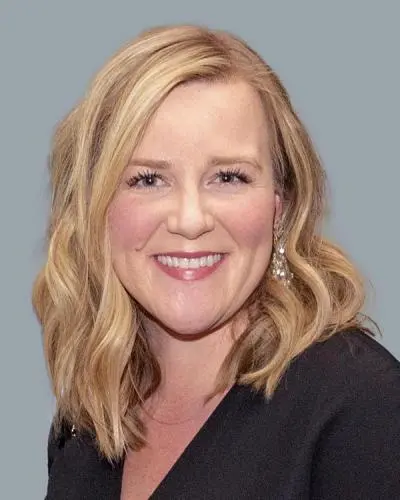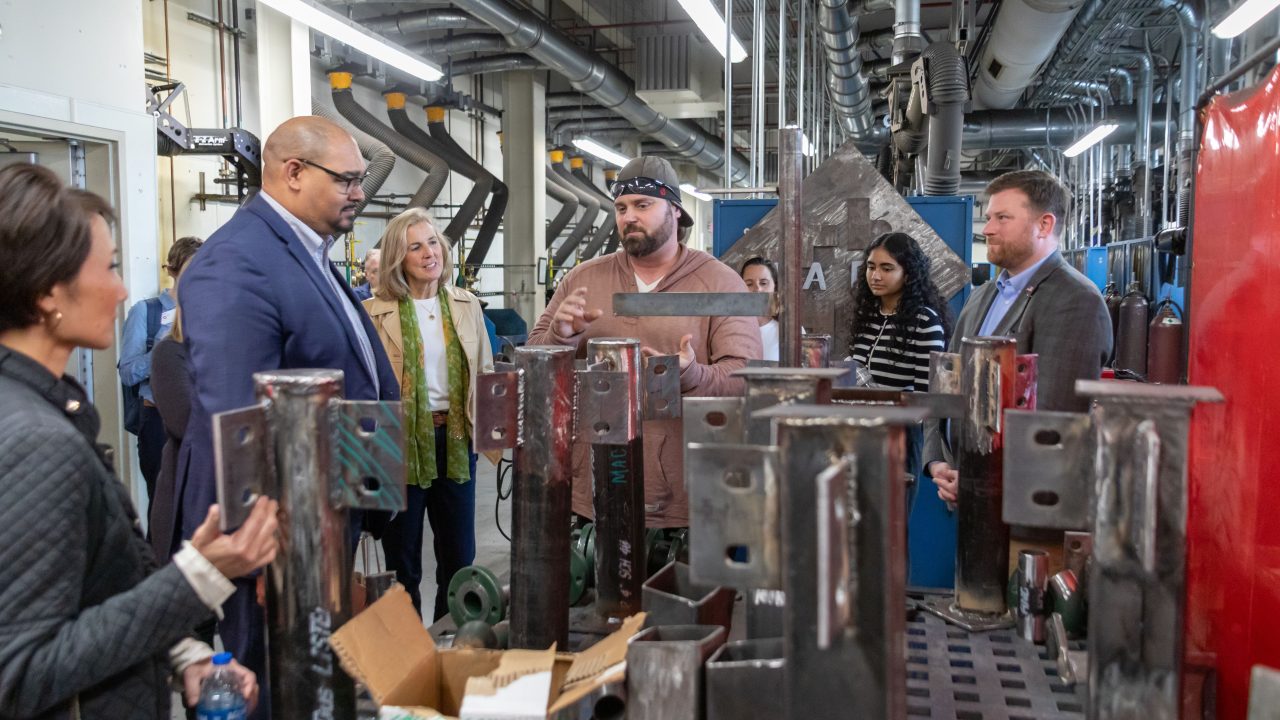“Any person that I knew of in the city of Atlanta who did anything ran it by Herman before they did anything else.”
These are the words of Anthony Dixon, senior project manager and 47-year veteran employee with H. J. Russell & Company. But ask anyone who knows anything about H. J. Russell, and they’ll say the same thing: The story of the company is the story of Herman J. Russell himself.
From humble beginnings in Atlanta’s Summerhill neighborhood came a young man with an unbreakable entrepreneurial spirit, who used that drive to forge an unlikely path to success in the Jim Crow–era South. What began as a plastering company in 1952 is today one of the largest Black-owned contractors in the United States, with Herman’s children—Donata Russell Ross, H. Jerome Russell and Michael B. Russell Sr.—at the helm (a natural fit for the family-focused firm).
Over its 72-year history, H. J. Russell has grown exponentially, contracted when necessary and persevered through segregation, the turbulence of the Civil Rights Movement and multiple economic downturns. Now, in the next five years, they’re poised to become a billion-dollar company.
But long before any of that, there was just a boy and a dream.
‘AN ENTREPRENEUR’S ENTREPRENEUR’
Herman Russell’s father, Rogers Russell, had just a fourth-grade education but was among the most sought-after plasterers in Atlanta in the 1920s and ’30s. (Fun fact: Rogers was contracted to perform all the plaster work on Atlanta’s famed Fox Theatre). It was Rogers Russell who taught Herman the plastering craft and instilled in him the importance of saving money.
Inspired by his father’s example, Herman began his first business at age 13—a shoeshine stand in his neighborhood—and in doing so fought through racial barriers (the permits department at the courthouse laughed in his face), a speech impediment and dyslexia (both of which he had for his entire life).
“Herman and I were born within a month of each other and within three miles of each other, but the two worlds could not have been more different,” Robert Holder, retired chairman and founder of Holder Construction, says in the documentary “Building Atlanta: The Story of Herman J. Russell.” “Everything in the world I was born into was designed to make sure I succeeded. Everything in the world he was born into was designed to make sure he did not succeed.”
But succeed he did. Herman saved up enough money from the shoeshine stand to purchase the lot across from his parents’ home, where he took leftover materials from his father’s projects and slowly built a house on the property. The rental income from that house paid his way through college at Tuskegee University, where in 1952 he earned a degree in building construction. That same year, he returned home to Atlanta and founded H. J. Russell Plastering Company. “He wasn’t just that guy that dad loaned him a few million dollars to get started,” T. Dallas Smith, founder and CEO of real-estate development company T. Dallas Smith & Co., says in “Building Atlanta.” “He was an entrepreneur’s entrepreneur, so anybody who wanted to have their own, anybody who looked like me…he gave us hope that it could be done.”
Herman married Otelia Hackney, a schoolteacher from rural Taliaferro County, Georgia, in 1956, and over the next several years took on larger projects that ranged from home building to real-estate investment. By the end of the decade, his business portfolio had expanded to include general contracting services and his business success boiled down to one simple fact: He was really, really good at what he did.
RIGHT PLACE, RIGHTS TIME
At the height of the Civil Rights Movement, in 1962, Herman Russell began his first major development project: a cluster of 12 residential units on South Avenue in Atlanta. A few years later, Nixon-administration programs designed to spur residential construction, particularly in the South, provided opportunities that made H. J. Russell one of the largest builders of HUD affordable housing.
The company’s track record of successful joint-venture partnerships on large-scale projects with white-owned construction companies bolstered Herman’s business reputation, attracting the interest of the then-all-white Metro Atlanta Chamber of Commerce. The chamber issued an invitation for Herman to join, not realizing that he was African American, and he accepted before the group could realize its “mistake,” making front-page news all across Atlanta. (In the 1980s, Herman became the group’s second Black president.)
During this time of rapid growth, Herman maintained close working relationships and friendships with the likes of Dr. Martin Luther King Jr. and other prominent Civil Rights leaders. In addition to offering counsel and sanctuary for them (“When Martin needed a place to relax and unwind, he’d go to Herman’s and hop in the pool,” Dixon says), Herman served as a behind-the-scenes financier of the movement, frequently posting bond payments when leaders were jailed.
“I remember I’d be in the office early in the morning, and I’d walk past Mr. Russell’s office, and he’d be sitting with Andrew Young or Vernon Jordan or Maynard Jackson,” Dixon says. “I remember he used to tell me things like, ‘Martin told me we need to be prepared when this thing breaks open.’ And I knew he was talking about Martin Luther King.
“You know, growing up in the Jim Crow era and then being able to attend college and take advantage of the opportunities Mr. Russell had given me—I don’t think I realized at the time the significance of it all. But now to think about it, it just brings chills to my whole body.”
A FULL-CIRCLE MOMENT
As the nationwide business environment shifted in the 1970s—Watergate, oil shortages and declining real-estate markets created uncertainty everywhere—so did H. J. Russell. While real estate and property development remained the company’s core business, Herman Russell realized the need to diversify. He founded a beverage distribution company, establishing a concessions business at Los Angeles International Airport, where H. J. Russell had previously performed construction services, and becoming part-owner of two major professional sports franchises: the NHL’s Atlanta Flames and the NBA’s Atlanta Hawks—making Herman the first African American in history to share ownership in a major U.S. sports franchise.
H. J. Russell continued on its growth trajectory over the next couple of decades, making its mark on the Atlanta skyline with headquarters for Fortune 500 companies, including Georgia-Pacific, Delta Air Lines and The Coca-Cola Company; improving public transit and infrastructure with projects for the MARTA rail-transit system and Hartsfield-Jackson; performing commercial construction services across the health-care, higher-education, industrial and entertainment markets; and more. In the 1990s, H. J. Russell joint-ventured on a stadium project for the 1996 Olympic Games—located in the very same Summerhill neighborhood where Herman grew up.
ALL IN THE FAMILY
In 2003, at 73 years old, Herman Russell decided it was time to retire, leaving his three children to run his enterprise—exactly the way the family man always wanted it. He passed away in 2014 at 83 years old. Today, Herman’s daughter Donata leads Concessions International LLC, an airport concessions group co-founded by Herman Russell and business partners Felker W. Ward Jr. and Jesse Hill Jr., with youngest son Michael serving as president and Jerome as CEO of H. J. Russell. From the top down and the bottom up, H. J. Russell has always maintained a family-first culture—and that includes a concerted effort toward ensuring that employees feel part of what the company calls the “Russell family.”
“We can’t do our business without people, and I’m excited to work for a company that invests in people really enjoying their jobs,” says Michael Swick, who joined H. J. Russell in 2019 as the construction division’s vice president of operations. “There’s so much work that goes into the secret sauce behind building our teams, and it starts with the hiring process and continues with workstyle assessments to ensure we’re putting folks on teams together who share similar communication styles and goals and that all team members are working from the same rule book.”
Yasmine Antoine, the company’s chief operating officer and general counsel, adds: “H. J. Russell is a very intentional organization in every sense—from developing teams to creating succession plans for every role. We want every person to feel that we have a vested interest in them and that there’s a future for them at Russell.
“I am a very purpose-driven individual,” Antoine says, “and so that intentionality is one of the things that drew me to this organization and one of the things that’s kept me here. Knowing that Mr. Russell built this company while also facilitating huge steps in the Civil Rights Movement—being here is like being a part of history.”
It’s not just anyone who takes $150 from shining shoes and turns it into what H. J. Russell is today: a nearly half-billion-dollar company, still a leader in the affordable housing market but with a diversified portfolio that includes joint-venture projects like the Atlanta Falcons’ Mercedes-Benz Stadium and the Smithsonian’s National Museum of African American History & Culture in Washington, D.C. “[Herman] knew how to merge business, politics, family, community—he knew how to pull all of that together, and in the end what you see is H. J. Russell & Company,” Dixon says.
A collective quote from the Russell siblings, as shared on the company’s website, describes their father’s legacy like this: “Every day we look out over the city that has presented our family with so many opportunities to be a part of its skyline and look for ways we can have an everlasting impact on the communities we serve, making them even better for the next generation.”








